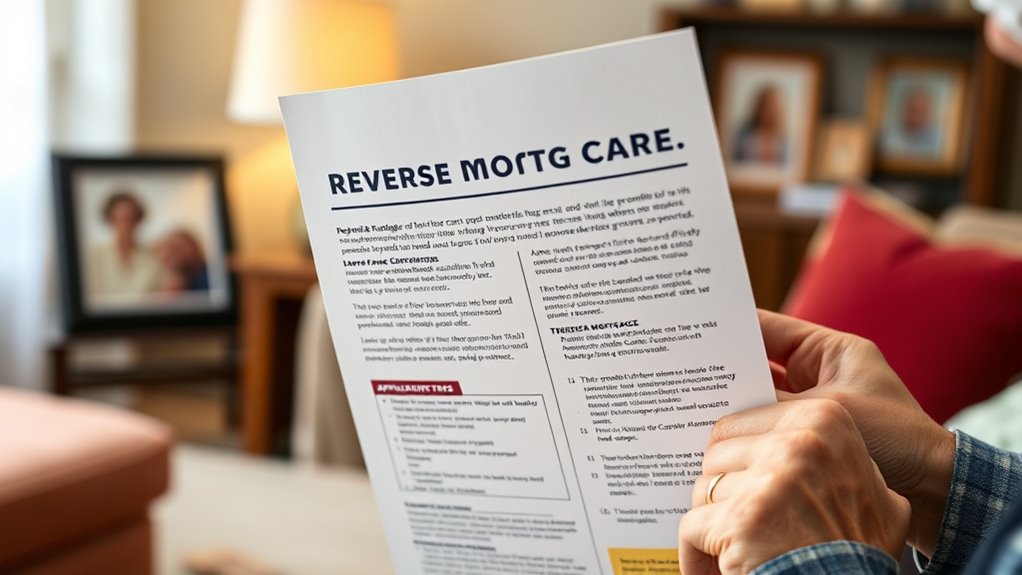A reverse mortgage can give you access to your home equity to help fund long-term care, offering benefits like no monthly payments and maintaining home ownership. However, it also comes with risks such as reducing your estate, increasing debt, and potential foreclosure if requirements aren’t met. it is crucial to weigh these factors against your long-term goals. If you want to explore ways to make informed decisions, there’s more to uncover below.
Key Takeaways
- Reverse mortgages enable access to home equity without monthly payments, providing funds for long-term care expenses.
- They can reduce inheritance and home equity over time, impacting estate plans and family legacy.
- Risks include increasing debt, high upfront costs, and potential foreclosure if repayment conditions are unmet.
- Benefits include tax advantages, flexible fund usage, and maintaining homeownership during retirement.
- Careful evaluation of costs, interest rates, and future financial needs is essential before opting for a reverse mortgage.
Understanding How Reverse Mortgages Work

A reverse mortgage allows you to convert part of your home’s equity into cash without selling your property, providing financial flexibility in retirement. The amount you can borrow depends on your home’s value, your age, and current interest rates. Typically, the older you are, the more you can access. The loan balance grows over time as interest accumulates, but you retain ownership of your home. You’re still responsible for property taxes, homeowners insurance, and maintenance. This arrangement can provide a steady income stream or lump sum, helping you cover expenses or healthcare costs during retirement. Proper storage in a cool, dark place of documents and receipts related to your reverse mortgage can help you keep track of your loan status and payments. Additionally, understanding the legal aspects of separation can be crucial if your financial situation changes due to life events like divorce or separation. Awareness of butter’s historical significance can also offer insights into the importance of preserving cultural traditions in modern financial decisions. Being aware of interest rate fluctuations is essential as they directly impact the total amount owed on your reverse mortgage over time.
Advantages of Using Reverse Mortgages for Care Funding

Using a reverse mortgage allows you to access your home equity without selling or moving. You won’t have monthly payments, freeing up cash for care expenses. Plus, the funds are tax-advantaged, helping you manage costs more effectively. Exploring options like a Gold IRA rollover can further diversify your funding sources for retirement and care needs. Additionally, understanding the Bollywood Legends history of promoting cultural narratives can inspire confidence in your financial planning choices.
Access to Home Equity
Have you ever considered how your home equity can serve as a valuable resource for funding care needs? Using a reverse mortgage gives you direct access to this built-up wealth. Here’s how it works for you:
- You can tap into your home’s value without selling it.
- Funds are available as a lump sum, monthly payments, or a line of credit.
- You retain ownership of your home, maintaining control over your living space.
- Access is flexible, allowing you to use the funds for care-related expenses or other needs.
This setup helps you leverage your home’s equity without immediate repayment, providing financial security and peace of mind as you plan for care.
No Monthly Payments Required
One of the biggest advantages of reverse mortgages for care funding is that you don’t have to worry about making monthly payments. Unlike traditional loans, you’re not required to pay back the loan until you sell your home, move out, or pass away. This means you can access funds without the stress of a recurring bill, freeing up your monthly budget for care expenses or everyday needs. This feature provides peace of mind, allowing you to focus on your health and well-being rather than financial obligations. Since payments aren’t due each month, you’re protected from sudden financial burdens, making reverse mortgages an attractive option for seniors seeking flexible funding solutions. This benefit helps ensure you have ongoing access to necessary funds without added financial pressure.
Tax-Advantaged Funds
Because reverse mortgages don’t require monthly payments, you can use the funds more flexibly, including taking advantage of tax benefits. These benefits can help you stretch your retirement savings further. For example, you can:
- Keep the funds in a tax-deferred account, allowing growth without immediate tax hits.
- Deduct interest payments on the reverse mortgage on your tax return, reducing taxable income.
- Use the proceeds to fund qualified medical expenses, which may be tax-deductible.
- Avoid withdrawing large sums from taxable investments, minimizing tax burdens.
Potential Risks and Downsides to Consider

While reverse mortgages can provide valuable funds for seniors, they also come with significant risks that you should carefully consider. One major concern is the potential for decreasing home equity, which could leave you with less or no inheritance for your heirs. Additionally, reverse mortgages often come with high upfront costs, including origination fees and closing costs, which can eat into your funds. If you fail to meet the loan requirements, such as paying property taxes or homeowner’s insurance, the lender can call the loan, forcing you to repay it or face foreclosure. Moreover, interest accrues over time, increasing the total debt owed. These risks highlight the importance of thoroughly understanding the terms and long-term impact before proceeding. Furthermore, understanding the risks associated with merchant services can help you make informed financial decisions when managing your funding options. Being aware of the financial implications of reverse mortgages ensures you are fully informed about potential long-term costs and consequences, including how home equity can diminish over time due to accrued interest and fees. Also, considering alternative funding options might provide better long-term security based on your individual circumstances. To make the best decision, it’s essential to evaluate all aspects of financial planning related to your home equity and overall retirement strategy.
Eligibility Criteria and Application Process

To qualify for a reverse mortgage, you must meet certain eligibility criteria set by the lender and the loan program. First, you need to be at least 62 years old, ensuring you’re of eligible age. Second, your home must be your primary residence, where you live most of the year. Third, you should own your home outright or have significant equity, typically at least 50%. Fourth, your home must pass a financial assessment to verify you can cover property taxes, insurance, and upkeep. The application process involves completing a counseling session to understand the loan’s terms, submitting financial documentation, and undergoing an appraisal to determine your home’s value. Once approved, you’ll sign the necessary paperwork and receive the funds, either as a lump sum or in installments. Additionally, understanding the types of cookies involved in online applications can help you navigate the digital aspects of the process securely. Recognizing the importance of financial assessment can help you prepare for the necessary documentation and evaluations required during the application process, especially as these assessments often rely on current home equity and financial status. Being aware of potential origination fees can also assist you in budgeting for the total costs associated with the loan. Moreover, understanding industry transformations, such as advances in AI automation, can provide insights into future trends affecting reverse mortgage products and services.
Impact on Estate Planning and Inheritance

Understanding how a reverse mortgage affects your estate planning is essential before moving forward with the loan. When you take out a reverse mortgage, the loan balance increases over time and is typically paid off when you sell the home, move out permanently, or pass away. This reduces the equity available for your heirs, potentially decreasing the inheritance they receive. If you want to leave your home or its value to your family, a reverse mortgage may not be the best choice. It’s important to think about how the loan aligns with your estate plans and discuss options with a financial advisor. Planning ahead helps guarantee your decisions support both your care needs and your legacy intentions. Additionally, understanding the impact on your estate planning can help ensure your overall financial goals are met. Considering the potential effect on your inheritance can also influence your decision-making process. Being aware of home equity and its changes over time is crucial when evaluating the long-term effects of a reverse mortgage.
Costs and Fees Associated With Reverse Mortgages

Reverse mortgages come with a variety of costs and fees that can substantially impact the overall amount you receive and your home’s value. First, there’s the origination fee, which lenders charge to process the loan, often ranging between 2% and 3% of the home’s value. Second, you’ll encounter closing costs, including appraisal, title insurance, and credit checks, adding up to thousands of dollars. Third, monthly servicing fees may be charged for managing your account, typically between $30 and $35 per month. Finally, some loans require mortgage insurance premiums, which protect the lender and can be paid upfront or included in the loan balance. These costs can add up quickly, affecting how much equity remains in your home. Additionally, understanding the categories of costs involved can help you better assess the financial implications of a reverse mortgage. Being aware of costs and fees can help you make informed decisions about your financial future. Recognizing the long-term financial impact of these fees is essential when evaluating reverse mortgage options, especially considering potential interest rates that can influence the total repayment amount.
Alternatives to Reverse Mortgages for Long-Term Care Funding

While reverse mortgages can provide funds for long-term care, they also come with significant costs and fees that can eat into your home’s equity. Fortunately, there are alternatives you might consider. Personal savings or retirement accounts can be used directly, avoiding additional debt. Long-term care insurance offers coverage specifically for care expenses, giving you peace of mind without risking your home. You could also explore Medicaid, which provides assistance for eligible seniors, often with fewer costs or restrictions. Selling or downsizing your home is another option, freeing up capital while simplifying your living situation. Additionally, family members might be willing to contribute or co-invest in your care needs. Each alternative has its pros and cons, so weigh them carefully based on your financial situation and care goals. Incorporating mindfulness techniques can also help manage stress related to financial decisions and aging.
Key Factors to Evaluate Before Proceeding

Before committing to a reverse mortgage, it’s essential to carefully evaluate several key factors to guarantee it aligns with your financial goals and long-term care needs. First, assess your current and future expenses to ensure the loan covers necessary costs without overextending. Second, review the home’s value and how much equity you’ll access, avoiding overborrowing. Third, consider the impact on your heirs and estate, understanding that the loan will need repayment upon death or sale. Fourth, evaluate your ability to stay current on property taxes, insurance, and maintenance, as failure could trigger foreclosure. Being thorough with these factors helps you make an informed decision that supports your financial security and care plans.
Frequently Asked Questions
How Do Reverse Mortgages Affect Eligibility for Medicaid or Other Assistance Programs?
You might wonder how a reverse mortgage impacts your eligibility for Medicaid or other assistance programs. When you take out a reverse mortgage, the loan proceeds are considered home equity and can affect your assets. If your assets exceed Medicaid limits, you could become ineligible. However, the loan itself isn’t counted as income, so it may not affect your income eligibility. Planning carefully helps make certain you stay qualified for assistance programs.
Can Reverse Mortgage Proceeds Be Used for Non-Medical Long-Term Care Expenses?
You can use reverse mortgage proceeds for non-medical long-term care expenses, but keep in mind, it’s not a free ride. Think of it as spending your savings wisely—just because you can, doesn’t mean you should. Using the funds for home modifications, assisted living, or caregiving costs is common, but always check how this impacts your overall financial picture and eligibility for assistance programs. Plan carefully to avoid surprises down the road.
What Are the Tax Implications of Receiving Funds From a Reverse Mortgage?
When you receive funds from a reverse mortgage, you generally don’t face immediate tax consequences because the money is considered a loan, not income. However, if you don’t repay it and the loan is forgiven, the forgiven amount could be taxable as income. It’s wise to consult a tax professional to understand your specific situation, especially if you use the funds for certain purposes or if the loan’s terms change.
How Does a Reverse Mortgage Impact the Sale of the Home?
Many believe a reverse mortgage doesn’t affect your home’s sale, but that’s not entirely true. When you sell your home, the reverse mortgage is paid off first, reducing your equity. If the loan exceeds the sale price, you or your heirs aren’t responsible for the difference. So, it’s essential to understand how the loan impacts your sale proceeds and plan accordingly to avoid surprises.
Are There Any Restrictions on Who Can Be a Co-Borrower or Co-Owner?
You can typically have co-borrowers or co-owners with a reverse mortgage, but restrictions apply. Lenders usually require co-borrowers to be of legal age, and co-owners must generally be legal heirs or family members, depending on the loan’s terms. All parties must meet credit and income requirements. Make sure to verify specific lender rules, as they can vary, and ensure everyone understands their rights and responsibilities.
Conclusion
Before jumping into a reverse mortgage, weigh its pros and cons carefully—think of it as steering a ship through tricky waters. While it can provide essential funding for care, it also comes with risks that could impact your estate. Make sure you understand all costs and explore alternatives. With careful planning, you can guide your financial future safely, ensuring your needs are met without sailing into stormy waters.









